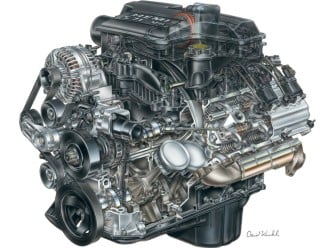Leaks in cylinder head gaskets-commonly referred to as "blown head gasket"-can cause leakage of coolant, combustion gases, or both.
Cylinder head gasket leakage is classified as either external or internal. External leaks are visible, such as oil or coolant on the outside of the engine (usually below). Internal leakage is when fluid enters another circuit and may cause coolant or oil to change. The former may be foam (caused by hydrocarbons) in the coolant expansion tank. Coolant leakage into the oil system may cause mayonnaise or milkshake-like substances in the oil, which can usually be seen on the dipstick or the oil filler cap. However, the presence of this substance is not decisive evidence of cylinder head gasket failure, because the oil can be mixed with the coolant in other ways. Similarly, it is entirely possible that the cylinder head gasket will fail in such a way that the oil will never come into contact with the coolant. Therefore, the condition of the cylinder head gasket cannot be finally determined by checking the oil.

The most common cause of a cracked or damaged cylinder head gasket is usually engined overheating. High engine temperatures are usually caused by the lack of coolant in the radiator, usually due to leakage. Depending on the material, some gaskets may weaken faster than others. For example, aluminum expands faster when heated. Metals with higher thermal expansion rates are more sensitive to heat. Higher temperatures can cause objects to change shape, which can produce unfavorable results. The expansion and deformation of the cylinder head due to heat will weaken its integrity, resulting in the cylinder head gasket not being properly sealed.
When a cylinder head gasket blown, it is important to solve this problem immediately. Continuing to use a vehicle with a blown gasket will cause serious and irreparable damage to the engine. Since the gasket is used as a seal, maintaining pressure is the key to engine power. Once the gasket blown, it can no longer function as a seal, and will release pressure, thereby significantly reducing the power of the engine. This is one of the few signs of a cylinder head gasket bursting. In addition, the oil and coolant passages may start to leak into areas that should not be leaking. When the coolant enters the combustion chamber, it mixes and dilutes the engine oil. It also reduces the cooling capacity of the cooling system, which may cause the engine to overheat.
Engine knocking is another cause of cylinder head gasket failure, because it can damage the armor or fire ring, causing cylinder pressure to leak out of the armor. Engine knock may be caused by poor quality fuel, engine failure, or attempts to select inappropriate fuel and/or ignition settings during engine tuning. If the knock is severe, the cylinder pressure will increase to more than 8 times the normal pressure, which will cause the cylinder head to lift from the engine block and break the seal between the two. Most gaskets used in standard production engines will be severely damaged by severe explosions.











